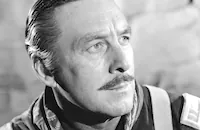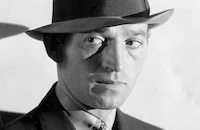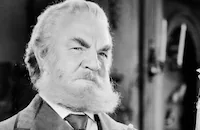Frontier Marshal
Cast & Crew
Lew Seiler
George O'brien
Irene Bentley
George E. Stone
Alan Edwards
Ruth Gillette
Film Details
Technical Specs

Synopsis
After masked bandits hold up a stage enroute to Tombstone, Arizona, the third daring crime to be committed in one week early in June 1890, banker George Reid accuses his partner, Mayor Ben Melton, of backing the outlaws and rustlers perpetrating the crimes. That night, Melton murders Reid. Following the robbery of a stage carrying Jewish shopkeeper David Ruskin, Michael Wyatt, who plans to stay in Tombstone only overnight, and Reid's daughter Mary, the three travelers arrive in Tombstone. After Michael shoots the gun out of the hand of drunken Ben Murchison, who has been shooting up the saloon, Melton offers Michael the job of marshal. Because of Mary, Michael accepts. When "Doc" Warren, known as the "coldest-bloodest" killer in the Southwest, tries to provoke a fight with Michael in the saloon, Michael stands up to him, whereupon Doc, who supposedly has no respect for life because he knows he will die soon from heart trouble, buys him a drink. To get information about Melton, Michael visits saloon singer Queenie La Verne, who makes no secret of her desire for him. In her room, Queenie, after unsuccessfully trying to seduce Michael, tells him that she has suspicions about Melton. As the town holds a baby contest to raise money for a school fund, Murchison breaks out of jail. In the dead jailer's hand, Michael finds Melton's watch fob. When Michael helps Doc after a man tries to shoot him, Doc gives Michael a letter that proves Melton killed Reid. Michael, who earlier warned Melton that he had a clue that would lead to the jailer's murderer, surprises Melton robbing his own bank and planning to leave town, but Michael is knocked out by one of Melton's men, and Melton retrieves the incriminating watch fob and letter. Melton accuses Michael of trying to rob the bank, and after the town's judge arrests Michael, Doc helps him escape. Michael gets word to David to follow Melton, and David overhears Murchison demand from Melton his cut of the stagecoach holdups and cattle rustlings, and then hears Melton say that Mary is going to Melton's ranch. Michael and Doc hold up the stage carrying Mary, who believes Michael to be a bandit, and take her to Queenie, of whom she has been jealous. Michael and Doc then engage in a gunfight with Murchison and his men, who are waiting to hold up the stage so that they can capture Mary. After Michael kills all but Murchison, he subdues Murchison and then convinces him that Melton tipped him off about the stagecoach robbery to get him out of the way. Murchison vows to testify against Melton. Meanwhile in town, a lynch mob forms to capture Michael. He gets Murchison into jail through the back entrance, and then, facing the crowd with a rifle, demands a chance to prove his innocence. Learning that Mary is being kept by Queenie, Melton goes to retrieve her, but Michael arrives with the judge, who says that Murchison has confessed everything. Melton pulls a gun to shoot Michael, but Queenie steps in front of him and takes the bullet. Melton is then shot by Doc as he tries to escape and falls to his death from a window. Queenie asks Michael to kiss her, and he complies as she dies smiling. Afterward, Michael and Mary embrace in the sunset.

Director
Lew Seiler
Cast

George O'brien
Irene Bentley

George E. Stone
Alan Edwards
Ruth Gillette

Berton Churchill

Frank Conroy

Ward Bond
Edward Le Saint
Russell Simpson
Jerry Foster
Marjorie Seavey
Eleanor Hoagland
Ruth Day
Ben Hall
Crew
Stuart Anthony
William Conselman
Duncan Cramer
Bernard Freericks
Hugo Friedhofer
Henry Johnson
William Kernell
Arthur Lange
Dudley Nichols
Paul Perez
Robert Planck
Royer
Bert Sebell
Winfield R. Sheehan
Sol M. Wurtzel

Film Details
Technical Specs

Quotes
Trivia
Notes
Stuart N. Lake's book on Earp, which the screen credits call a novel, consists of four articles that were originally published in The Saturday Evening Post: "Buffalo Hunters" (25 October 1930); "Guns and Gunfighters" (1 November 1930); "Tales of the Kansas Cow Towns" (8 November 1930); and "The Frontier Marshal" (15 November 1930). According to Variety, "the hero's name is changed [in the film from Wyatt Earp] to Michael Wyatt, to fend the suits which follow the production of a pseudo-historical play." According to information in the Twentieth Century-Fox Records of the Legal Department at the UCLA Theater Arts Library, in 1929, the year that Wyatt Earp died, Lake, Earp, and Earp's wife had agreed in a contract to equally divide any royalties from the motion picture rights to Lake's work. Also, according to the legal records, Earp's widow approved the contract between Lake and Fox, dated October 7, 1932, which gave Fox the motion picture rights concerning Lake's work. Included in the legal records is a letter from Lake in 1939, before production began on Twentieth Century-Fox's remake of this film, in which Lake states that when he sold the rights to his work to Fox in 1932, "it was definitely promised to me, orally, that I was to be employed on the adaptation and screenplay. (I still have all the publicity and year-books announcing the story as a starring vehicle for Warner Baxter.) They sent for me a half-dozen times to come up and talk over things. Bob Yost, Dudley Nichols and Lamar Trotti were all in on some of the huddles, and it was understood that I was to go to work-verbally. I had two or three long talks with Sol Wurtzel about the thing....Then, to my amazed disappointment, Wyatt Earp was thrown as a sop to Sol Lesser and George O'Brien, a picture turned out for $120,000 and I was left out of pocket and time. They even asked me to come up and talk to the Lesser-O'Brien writers, which I did, but from the first day I talked with Wurtzel, I had sense enough not to tell him, or his help, all that I knew [about Earp]." It has not been confirmed that Yost, Trotti or Lesser were ever involved with this film, or that it was originally intended as a starring vehicle for Baxter.
Some character names in the onscreen credits differ from those given in the film's dialogue: the character played by George E. Stone is called "David Ruskin" throughout the film, but is listed as "Abe Ruskin"; that played by Berton Churchill is called "Ben Melton" in the film, but is listed as "Hiram Melton"; and that played by Frank Conroy is called "George Reid," yet is listed as "Oscar Reid." Many of the reviews commented on the similarity of Ruth Gillette's portrayal to Mae West; New York Times noted that Gillette "has the audacity to use some of Mae West's lines from She Done Him Wrong." Other films based on the same source include the 1939 Twentieth Century-Fox film of the same name, starring Randolph Scott and directed by Allan Dwan (see below); the 1946 Twentieth Century-Fox release of a Samuel G. Engel production entitled My Darling Clementine, starring Henry Fonda and directed by John Ford; and a 1953 Twentieth Century-Fox release of an Andre Hakim production entitled Powder River, starring Rory Calhoun and directed by Louis King. The 1993 film Tombstone, directed by George P. Cosmatos starred Kurt Russell as Wyatt Earp and Val Kilmer as Doc Holliday. In 1994, Lawrence Kasdan directed the film Wyatt Earp, starring Kevin Costner as Earp.












